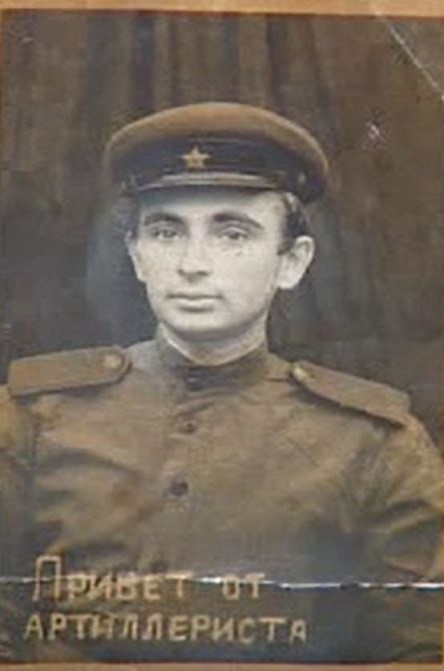Vladimir Lakhterman was born in 1926 in Kiev, in a Jewish family. His father Veniamin and his mother Hava Vinokur were both tailors. The two had originally met at a Jewish (Yiddish) amateur choir, where they both sang. The parents, being "progressive" people, decided not to circumcise Vladimir, their firstborn son. This fact would save his life during the Soviet-German War. The parents spoke Yiddish between themselves, but addressed their children in Russian. Vladimir was raised bilingual, while his younger brother Mark failed to master Yiddish. Despite being irreligious, the family ate matzoth during Passover.
Following the outbreak of the Soviet-German War in June 1941, Vladimir's father Veniamin was drafted into the Red Army. At the end of that year, he was declared "missing", which meant either that he had been taken prisoner by the enemy, or else killed in action, and his body was never recovered. In late summer 1941, Vladimir and his mother and brother were evacuated, settling at the Divnaya railway station in the North Caucasus, on the edge of the Kalmyk steppes. In August 1942, the area was occupied by the Germans and their allies. This time, the family failed to evacuate. Hava insisted that Vladimir live separately from them, in a faraway village: With his fair complexion, he could easily pass for an "Aryan" – unlike his mother and brother, who had a markedly "Semitic" appearance. Thus, Vladimir, who adopted the Russian-sounding alias "Vladimir Vinokurov", began to work as a farmhand in a Cossack village. In the fall of 1942, he and his fellow farmhands, stragglers from the Red Army, were detained by the Romanian military. The Romanians realized that Vladimir was not a former soldier, but they made a routine check to make sure that he was not Jewish. Being uncircumcised, he passed this check. Vladimir and his straggler comrades were sent to the Dubovka POW camp – which, paradoxically, was located fifty kilometers north of Stalingrad, which was about to become the site of a major battle. At the POW camp, Vladimir fell ill with typhus. In February 1943, the camp was liberated by the Red Army; at this time, Vladimir lay unconscious at the Revier (camp hospital).
Following a stay at a Soviet military hospital, Vladimir was sent to the recently liberated Rostov Region. In the village of Zavetnoye, he turned seventeen, and was immediately drafted into the Red Army. Despite not being fully recovered, he was sent to Kuibyshev (present-day Samara) for military training. He was trained as an anti-aircraft artilleryman, and in mid-1943 he took part in the air defense of Kuibyshev, which was not a frontline city. In the fall of 1943, Vladimir's unit was transferred to the area of Smolensk, where the Red Army's Western Front was fighting to liberate the city. He was attached to a cannon crew as a charger. Lakhterman recalls1 that charging was the most physically demanding job for an artilleryman.
"I weighed 40 kilograms [about 100 pounds] after the camp, while each shell weighed 14 kilograms" 2
Besides, the positions of his battery were targeted by German bombing raids every day. Vladimir began to suffer from seizures with loss of consciousness, and was sent to a military hospital in the recently liberated Smolensk, where he spent more than a month. After his discharge, Lakhterman was transferred to the rear, and he continued his military service far from the front lines. His last wartime job was repairing tanks and other types of armored vehicles.
Lakhterman received no military decorations during the war. His mother and younger brother perished in the occupied North Caucasus; his grandparents were murdered in Babii Yar.
In 1950, Lakhterman was discharged from the military. At that time, the Stalinist anti-Jewish campaign was getting underway, and he ran into difficulties when trying to return to his native Kiev and enroll in an institute (technical university). He continued to work as an engineer. In his later years, Lakhterman became more religiously observant.







